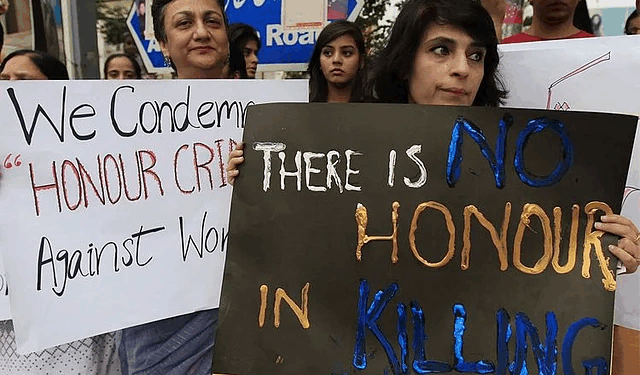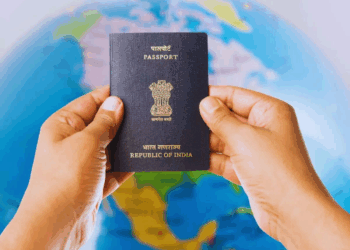A chilling video has surfaced on social media showing the execution of a young couple near Quetta, Pakistan, in what authorities have confirmed as a so-called ‘honour’ killing ordered by a tribal jirga. The footage, which has gone viral, has horrified the nation and reignited debate over the continuing grip of parallel justice systems and gender-based violence in parts of the country.
The Execution: Caught on Camera
The incident occurred in the Degari area, a coal-mining region near the provincial capital of Balochistan. According to police, the victims— a man and a woman who had reportedly married for love— were invited by their families under the guise of a reconciliation meal. What awaited them instead was a death sentence.
They were forcibly dragged from a vehicle into a desolate desert area and executed at point-blank range. The man was shot nine times. The woman was shot seven times. The person who pulled the trigger on the woman was her own brother, as confirmed by police and medical authorities.
Autopsy and Evidence
Police surgeon Dr. Ayesha confirmed through autopsy reports that both bodies had been shot multiple times, confirming the brutality of the crime. The bodies were exhumed for investigation after the viral video sparked public outrage.
State Intervention and Arrests
In response to national uproar, the government took swift action. A case was registered under Section 302 (murder) of the Pakistan Penal Code and provisions of the Anti-Terrorism Act. The First Information Report (FIR) was filed by the state, not the victim’s families, to ensure prosecution regardless of possible future pardons.
At least 14 suspects have been arrested so far. Among them is Sherbaz Khan Satakzai, a tribal elder believed to have ordered the killings. He is currently under police custody on physical remand. Authorities have vowed to continue making arrests.
Political and Legal Response
Balochistan Chief Minister Sarfraz Bugti condemned the killings as “barbaric” and suspended the local Deputy Superintendent of Police (DSP) for failing to report the incident in a timely manner.
“No one has the right to kill another human being in such a brutal way, and then record it on video,” Bugti said during a press briefing. “We are committed to ensuring justice through the courts.”
The Chief Justice of the Balochistan High Court, Rozi Khan Barrech, has also taken suo motu notice of the case and summoned top provincial security officials.
What is an ‘Honour’ Killing?
So-called honour killings involve the murder of individuals, often women, by family members who claim the victim brought ‘dishonour’ to the family—commonly due to choosing their own partner, alleged infidelity, or even being a victim of sexual assault.
Pakistan amended its laws in 2016 to close loopholes that previously allowed perpetrators to go free if pardoned by the victim’s family. However, implementation has remained weak. Under Section 311 of the Pakistan Penal Code, the state can intervene in such cases under the clause of ‘fasad-fil-arz’ (mischief on Earth), but courts often still accept private settlements.
This case, in which the state is the complainant, is considered a test of the country’s legal resolve to counter the culture of impunity surrounding honour-based violence.
A Culture of Violence
According to Human Rights Commission of Pakistan (HRCP), 346 people were killed in honour-related crimes in Pakistan between January and November 2024. Despite public awareness campaigns and legal reforms, parallel justice systems such as tribal jirgas continue to operate in rural areas with impunity.
The Degari incident has added to a growing list of horrifying cases:
- Jaffarabad, Balochistan (2025): A woman and her husband were executed for marrying without family consent. The murder was filmed and circulated online.
- Attock, Punjab (2025): A new mother was killed by her husband and father-in-law over unfounded ‘character issues.’
- Lower Dir, Khyber Pakhtunkhwa (2025): A couple suspected of illicit relations was killed by community members.
- Kohistan Video Case (2012–2023): Teenage girls were allegedly murdered for clapping in a wedding video. The case dragged on for years amid cover-ups.
- Samia Shahid (2016): A British-Pakistani woman was lured to Pakistan and murdered by her family.
Public and Activist Outrage
Women’s rights activists and legal reform advocates across Pakistan have condemned the Degari killings.
“This isn’t just a crime; it’s a collapse of humanity,” tweeted one prominent lawyer. “This time, we must demand convictions—not condolences.”
Several civil society groups are calling for a federal investigation, fast-track courts, and full enforcement of anti-honour killing laws.
The Road Ahead
While arrests have been made and public statements issued, many remain skeptical about long-term justice.
“The jirga system has no place in a constitutional democracy,” said a legal analyst on a national news broadcast. “We cannot allow mob justice and tribal orders to override state law.”
The Degari case presents both a tragedy and an opportunity. With widespread attention, documented evidence, and public pressure, authorities now face a crucial test: Will this be the moment when honour killing in Pakistan finally becomes legally and socially indefensible?
📌 Stay updated on this developing story and more at https://desertfeed.com





